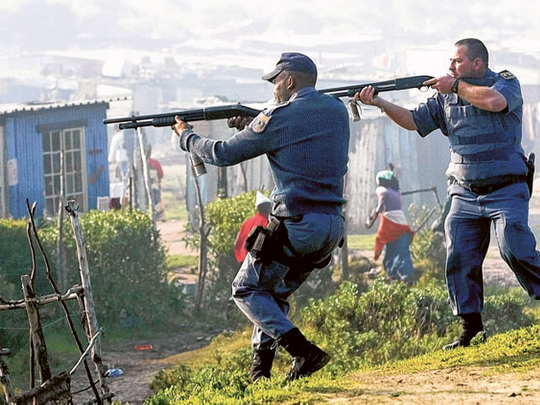
Johannesburg: A South African teacher died in a beating too violent for a broadcaster to keep on air and so reminiscent of apartheid-era police brutality it raised questions over whether the country's police service was failing.
Andries Tatane was shot in the chest with what were likely to have been rubber bullets and beaten by over half a dozen officers at a protest this week over poor delivery of municipal services in Ficksburg, 300km south of Johannesburg.
The incident was videotaped and shown nationally on state broadcaster SABC, which then stopped airing it after the ruling African National Congress and others complained the images were too shocking and disturbing.
Unarmed protester
"In what the ANC can only describe as resembling apartheid-era strong arm tactics ... members of the South African Police Service violently killed an unarmed protester after severely beating him in the full glare of the Ficksburg community," the ruling party said in a statement.
Police said they were investigating the Tatane case and no officers have been disciplined yet. Tatane was black as were most of the police seen on the video.
The number of people killed by police has dropped sharply since apartheid, but there were still almost 1,000 deaths in police custody or as a result of police action in the year ending April 2010, according to the Independent Complaints Directorate, which investigates police abuses.
Seven of those deaths resulted from torture, it said.
The ANC, which took power when apartheid ended 17 years ago, tried to change a police force known for the arbitrary and brutal killings of thousands who wanted to end white-minority rule.
It changed the name from police "force" to police "service" and said its focus was to protect all citizens.
But the police service today is filled with underpaid officers prone to corruption who have done little to combat some of the highest crime rates of any of the Group of 20 global economic powers.
A former chief was convicted a few months ago of corruption and the current chief has been admonished by the public protector's office for a questionable land deal.
The reasons for the high death figures are improper leadership on the part of the police and the violent nature of crime in the state, which requires aggressive responses by police, the Centre for Violence and Reconciliation said.
Economic injustice
Business consultant Itumeleng Mahabane said in an opinion piece in the country's main financial daily, Business Day, on Friday Tatane's killing was a reflection of the economic injustice that permeates the new South Africa, where police seemingly care little about protecting the poor.
"This is not simply about police brutality. It is about national brutality," he wrote.
"It begins with the acceptance of the brutality of poverty and economic injustice."












